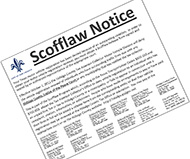10/8/2020
New Orleans, Louisiana Dodges Payment Of $25 Million Owed To MotoristsNew Orleans, Louisiana seeks dismissal of federal lawsuit charging it with failure to pay court-ordered refunds to wrongly fined motorists.

The city of New Orleans, Louisiana, calls drivers who fail to pay tickets "scofflaws" before threatening to hurt their credit rating, place boots on their cars or impose other coercive measures to enforce payment. The tables have turned, however, as the city finds itself in the position of being the scofflaw as attorneys for motorists are fighting in federal court to force New Orleans to pay back over $25 million in speed camera tickets that were illegally issued.
The state Court of Appeals, in a ruling that the Louisiana Supreme Court let stand, said under the city's own home rule charter, that traffic regulations must be enforced by the police department. From 2008 and 2010, however, the Department of Public Works (DPW) allowed American Traffic Solutions (now Verra Mobility) to issue tickets under DPW's authority.
"Because the DPW had no authority under the city's home rule charter to administer, adjudicate, and enforce the original automated traffic enforcement system (ATES) regulation, the original ATES ordinance was unlawful, invalid, and null and void ab initio," the state appellate court concluded. "Because the ATES was an invalid ordinance, without effect, until it was placed under the New Orleans Police Department on November 4, 2010, the trial court correctly ruled for the immediate return of the $25,612,690.32 in ATES fees and fines collected from tickets."
In September, US District Judge Susie Morgan rejected the city's attempt to throw out the case, forcing the city to come up with new arguments. Municipal lawyers now insist that the court-ordered judgment cannot be paid because it would reduce the revenue available for spending by New Orleans politicians and motorists should not be allowed to turn to a federal court to enforce a state judgment.
"An obligation to pay money impacts policy because the money used to pay a judgment will be unavailable for other purposes, such as public health and public safety expenditures," New Orleans attorney James M. Garner wrote in a filing last week.
The motorists argued that their right to property was "taken" by a government body in violation of the Fifth Amendment. Not so, the city replied, because it can just indefinitely delay paying what is owed.
"Plaintiffs cannot allege a takings because, as the Eastern District of Pennsylvania stressed, a takings claim only arises with property is legally taken," Garner wrote. "The city has not refused to pay the judgment and, therefore, the city has not taken plaintiffs' property."


